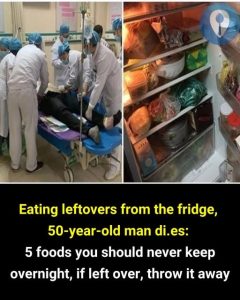Some leftovers seem harmless—but can become risky, even toxic, if stored too long. From chemical changes to bacterial growth, here are the top foods you should eat fresh (and why):

🍄 Mushrooms & Wood Ear Fungus
These spoil quickly. Their proteins and nitrates can turn into harmful nitrosamines, especially when reheated. Best eaten the same day—don’t risk it.
🥬 Leafy Greens (Spinach, Arugula, Beet Greens)
High in nitrates and delicate vitamins, these greens degrade fast. After 12 hours, they can harbor gut-irritating compounds. Store with a paper towel, and eat ASAP.
🥛 Soy-Based Foods (Tofu, Tempeh, Fresh Soy Milk)
Bacteria like Clostridium botulinum thrive in soy’s moist, protein-rich environment. Always refrigerate under 4°C (39°F), use clean utensils, and finish within 24 hours.
🥚 Soft-Boiled or Poached Eggs
Partially cooked eggs leave room for salmonella. Even chilled, they’re risky. Eat hot and fresh, or fully hard-boil if saving for later.
🐟 Seafood (Shellfish, Tuna, Mackerel)
Fish spoils fast and can produce histamine toxins—especially if not stored on ice. Eat within 8 hours. If it smells “off,” throw it out.
🧊 Food Safety Tips That Matter:
-
Store all leftovers below 4°C (39°F)
-
Use shallow, airtight containers
-
Label with date and time
-
Eat within 24 hours
-
Reheat only once to 74°C (165°F)
Your fridge isn’t a time machine. Some foods just aren’t meant to last. Handle them wisely—and protect your health, every bite of the way.





